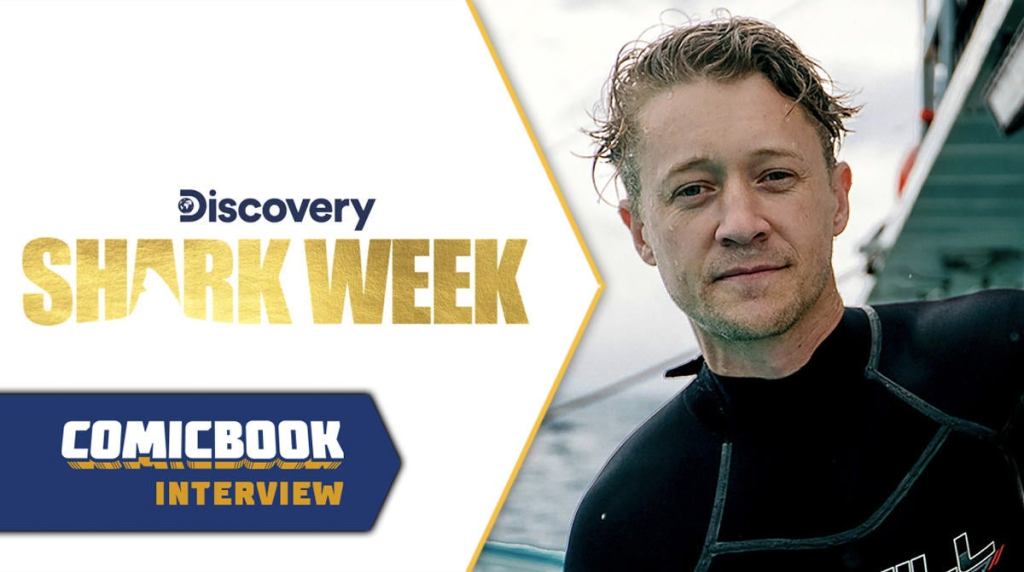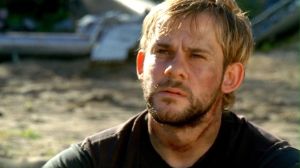Discovery Channel’s Shark Week has been a staple of the summer for decades, with each year seeing the event grow even more massive in scope. Recent years have seen the week-long event celebrating the majestic fish by expanding to the companion piece Shark Week: The Podcast, in which marine biologist Luke Tipple dives even deeper into the world of sharks, igniting conversations that chronicle the struggles the famous fish face due to their deadly reputation. Shark Week: The Podcast has returned for its fourth season, which continues to highlight the relationships between humans and the ocean, while also offering insight into what listeners can do to make sure there are sharks for future generations to celebrate. You can head to sharkweek.com to check out the podcast and to get all the latest updates on the Discovery event.
Videos by ComicBook.com
Shark Week: The Podcast is described, “Marine biologist Luke Tipple welcomes a wide variety of guests to discuss sharks, the ocean, and how the world’s biggest ecosystem impacts your daily life. You’ll hear inspiring stories from shark encounter survivors, learn cutting-edge science from the world’s foremost researchers, and listen in to controversial topics, like is it okay to kill sharks in the name of science? Or what’s the connection between shark fin soup and human trafficking? Join Luke and explore the surprising links between our lives on land and life in the ocean. Available wherever you get your podcasts.”
ComicBook.com caught up with Tipple to talk sharks, this season’s episodes, and what the future could hold for the series.

ComicBook.com: In what could possibly be the easiest or the most difficult question to ask you, what is your favorite type of shark?
Luke Tipple: Most people would want me to say something like the great white shark, I do have a fondness for a lot of species, but I’m a big fan of the whale shark, because they’re just big monsters of the ocean. They eat plankton and they’re gentle giants, and I just think they’re so cool. It’s also the first professional job that I had specifically with sharks was tagging whale sharks, but there’s always been a soft spot in my heart, giving me this intrigue about what has become my life.
Great white sharks, it’s hard to deny how incredible they are, but I appreciate you going with the gentler approach. Personally, my favorite, I think, is the Greenland shark, just because they’re so bizarre, and so strange, and live in such bizarre climates.
I think I described a Greenland shark on a podcast recently as kind of like an earthworm with gills and teeth. If you blew it up, like, 500 times, you’d be something in the vicinity of that. They’re a cool-looking shark, for sure.
Speaking to your career and your history both as a marine biologist and your study of sharks, can you recall, was there a specific moment in your history where you realized, “Not only am I going to make this my career,” but also how you came to develop a love of sharks? Were they hand-in-hand? Did one come before the other?
I always take it back to when I was a kid, being five years old and watching Jacques Cousteau documentaries. My dad was a big ocean guy and he wasn’t a big fan of me watching trashy TV and cartoons and stuff, but I was allowed to watch documentaries, so I got hooked on Jacques Cousteau. I was just enamored at the thought of being on a boat with a bunch of my best friends, like he was, and traveling around the corners of the globe and exploring shipwrecks and sharks and stuff. I’m very fortunate in that that’s what I’ve gotten to do a lot of in my career.
Sharks specifically, though, I think it developed over time, as I entered the water and started training for free diving and spearfishing and stuff, again, as a young kid, and surfing and everything I was doing, just in, on, and under the ocean. I just developed this fascination with sharks and being the kings of the ocean. The undisputed mystery, big animals that just … I think just the power of them just really fascinated me when I was younger.
I always had this idea that I’d want to be a marine biologist and study sharks, but I didn’t actually take that seriously. I mean, I put in my application for it when I was going through high school in Australia. You’ll apply for college, or uni, and it’ll be in your senior year, basically you’ll make those decisions. And I made two applications, one was for marine biology and one was for international business. I got into both programs and I went with international business purely because I didn’t see a way to make a lot of money doing it. I don’t think I was at a point in my life where I thought that being a scientist stuck in a lab the whole time was what I wanted to do, and I couldn’t really see a career being made without doing that. The college that I got into was a long way away from home and all those things just lumped together and I decided, “Oh, I’ll go do business, I’ll make a bunch of money, and I’ll just dive with sharks and stuff on my spare time.”
I did a year of college, I didn’t even finish that year. I think my finals were on a week where the surf was just absolutely pumping. It was like a historic swell for our area. So I went surfing instead of going to my finals and I came back. My mom’s like, “What are you doing? You’re supposed to be at your exams.” I’m like, “Yeah, I’m going to go study marine biology.” So I dropped out of college and went to the other college, and the rest is history. Went into marine bio and I found that fascination with being able to study something I was just in love with and having a connection with the animals. At the same time as being in college, I finished all my dive training and became a dive master and then instructor. And, even before I graduated, I finished my finals for marine biology, and three days later, I was flying out to Honduras for my first assignment, to be the resident marine biologist for the island out there, tagging whale sharks.
Your primary career, you’re diving with sharks and getting in the ocean and getting close to these animals. But I’m sure to some people it might be more intimidating with, “You’re going to be the host of a podcast.” Was there any nervousness or trepidation? Did you feel, “I’m going to have to embrace a whole new set of skills to be a podcaster,” or did you feel like just your passion and various other opportunities you had lent themselves easily to transitioning to taking on this new aspect of your career?
I’ve been fortunate in that I was working with sharks and then someone stuck a camera in my face and said, “Hey, tell us about what’s going on.” And then, the next thing you know, I’m appearing on TV and I did a couple of small documentaries, and I even hosted a couple of game shows back in the day when I was living in Los Angeles. Did a whole bunch of random stuff, but always came back to sharks.
My relationship with Discovery Channel has been now over a decade of working with and for them, and I’ve done their podcast before but not like doing it this year. I really felt passionate about letting scientists have a voice, and I’ve constantly made pitches about TV shows and I’ve been successful in making quite a few of them about giving scientists a voice. Shining a light on the scientists who perhaps aren’t as fortunate to have a camera in their face all the time, or that their research gets a small light shown on them but they never get a full-length time to really explain what it means.
That’s what I really wanted to do with this podcast, was say, “Hey, let’s have some real conversations about the ocean, about sharks, and talk about some of the nitty-gritty of science. Some of the difficulties, some of the challenges, and where we’re going as a species, as scientists, where is our knowledge base going?” A podcast is the exact format to do that in.
I’m not nervous so much about the conversational part of it, because I love talking science and I think that my history in the entertainment spaces is long enough that I can carry the show. But I certainly feel the responsibility of doing the right shows and letting the right scientists present their research and letting that spotlight shine on some things that can really change the world.
Going along with what you were hoping to do with the podcast and furthering the conversation, did you have, as compared to say the first three seasons, heading into Season 4, was there any main through-line of, “These are the things I want to accomplish with this season,” or is it similar to past seasons where it’s an eclectic mix, that the excitement is in the diversity of topics that you cover?
Over the years, it’s changed. The first two seasons really weren’t much of a podcast. They weren’t thought of it that way. Actually, I was asked to host them as five-minute spots that were going to be inserted into Shark Week in a linear format, so in TV. It was never really thought of as a recorded audio medium. Season 3 changed that. They started to change it into a proper podcast. We didn’t have video, it was just audio. But, still, it was an accompaniment to Shark Week in that we wanted to feature the TV shows, the scientists, more of a behind-the-scenes of the Shark Week episodes.
This year I had the opportunity to take a bit of a more active role, so I’m executive producing it this year, my company Delve is producing the whole podcast. When we were talking to Discovery about it, they said, “Hey, what would you do if you could think out of the box on this whole thing?” We brought them a couple options, and what I really wanted to do was say, “Hey, look. Shark Week: The Podcast doesn’t need to be a mouthpiece for the TV shows. The TV shows, documentaries, they stand on their own. They’re awesome pieces of cinematography. All the information that’s necessary really should be in those shows, so we don’t necessarily need a behind-the-scenes show. What we need is a forum and format where scientists from all different places, sometimes from the actual shows themselves, sometimes from completely random places that haven’t ever had that spotlight, can talk about real ocean issues.”
I wanted to answer questions, because I think people are fascinated with sharks and they have so many questions about the ocean, that we have an opportunity to say, “Hey, we can give you, in a 20-to-30-minute podcast, all the information you need to know, up-to-date science on a particular topic that really could change the way that you think about the planet, about the ocean, about sharks, or about your own behavior as a human being.” I think that culpability that we have as scientists, and I love that the Discovery Channel has embraced that because we do have the responsibility to share that science and that message with the rest of the world. Using the Shark Week brand to do that, I think gives us a leg up, obviously in the brand recognition, but also expands the capacity of Shark Week where we can go year-round and talk about ocean and shark issues year-round.
We all come together for that one week where we’re like, “Yeah!” Binge on shark stuff for a week during Shark Week, but they don’t just exist in a week-long vacuum. These are issues and topics that are ongoing and things we can talk about year-round, and we can be part of that constant source of information, education that the people want. And I’m proud to be part of that.
The first two episodes are now live, but of this season, is there a particular favorite that you’re really proud of or excited by?
I think there’s a couple. Episode 2 is about how shark fishing funds human trafficking. It’s a Pulitzer Prize-winning reporter by the name of Ian Urbina, and the conversation I had with him was just mind-blowing. He’s spent years and years out in the field working with fishing boats that are often operating, certainly illegally, if not just horrifically, to be honest. There’s a legitimate tie between illegal fishing and shark fishing and human slavery and human trafficking that I just had no idea about. Even for somebody who talks about ocean stuff my entire life, to hear that side of it was really enlightening and I’m excited. I mean, it’s a heavy topic, but it’s one that I think people really should be aware of. So I’m super excited about that one.
Some of the other ones I’m super excited about is an ongoing series. What we’ve thought about in this podcast is we’re going to have ongoing features, and one of those will be the how-to’s. These are questions people come up to me and ask all the time. When Shark Week comes up, people say, “Hey, how do I get a job working with sharks?” I’m like, “Hey, let’s do a show on how you get a job working with sharks.” I can invite a few of my friends on and we can talk about their experiences in turning their passion for sharks into a career and, what does that mean? Can they actually make money? I think that for myself as a kid, almost wasting time trying to get to where I really felt like I was supposed to be in the end, being in marine biology. The story I just told you, wasted my time going into business. I’m sure I learnt something in there, but I can’t remember what it is.
So we can help people make their active decisions about how to be a marine scientist or how to be a shark filmer or how to activate their passion for sharks or the ocean in one way, shape, or form. The how-to is going to be really fun, and throughout just answering these questions that people have, as well as bringing in these features, like Ian Ubrina, I think we aim to give people a variety but these regular features we can come back to.
Looking to the future of this podcast, could you ever see it extending outside of Shark Week? Or is it the type of thing where you do enough on-camera supplemental pieces that you can scratch that itch in other ways? Also, is there a dream guest or dream topic you’re hoping to return with in Season 5?
Our intention right now is to produce these Shark Week podcasts year-round, and I believe that that’s the intention of the people we’re working with at Discovery. That is the goal. Obviously, the listeners will have that vote if there is the continued listening interest outside the promotional periods of Shark Week. I believe that people do want to hear about ocean and shark things throughout the year. And, in doing that, we’re not doing a show, every show about sharks.
I think people that are interested in sharks are also interested in, it might be ocean policies or environmental things, or clean-up programs that are helping out, or ways that they can expand their knowledge base. Might end up doing a show about mountains or farming runoff, and how that affects the ocean. There’s so many environmental issues and also interesting things to learn about the Earth that are connected with sharks and the ocean. And I see that, where we go as a year-long arc always having an anchor point of sharks, but expanding our topics into places where people who are interested in sharks will also find themselves.
And as far as dream guest, I would have loved to have had Jacques Cousteau on one day, but obviously that’s not going to happen. I guess we’ll see when we get to it. Actually, I will put him on if it’s going to hit the air, not that he’s a massive shark guy, but I do want [Dirty Jobs host] Mike Rowe on the show sometime because I think he’s just a good guy. I think he’d be a fun guy to chat to. But besides that, I’m looking forward to talking to a lot of different ocean voices.
The first two episodes of Shark Week: The Podcast are out now and Shark Week kicks off on July 23rd on Discovery Channel. You can head to sharkweek.com to check out the podcast and to get all the latest updates on the Discovery event.
This interview has been edited for length and clarity. You can contact Patrick Cavanaugh directly on Twitter.








